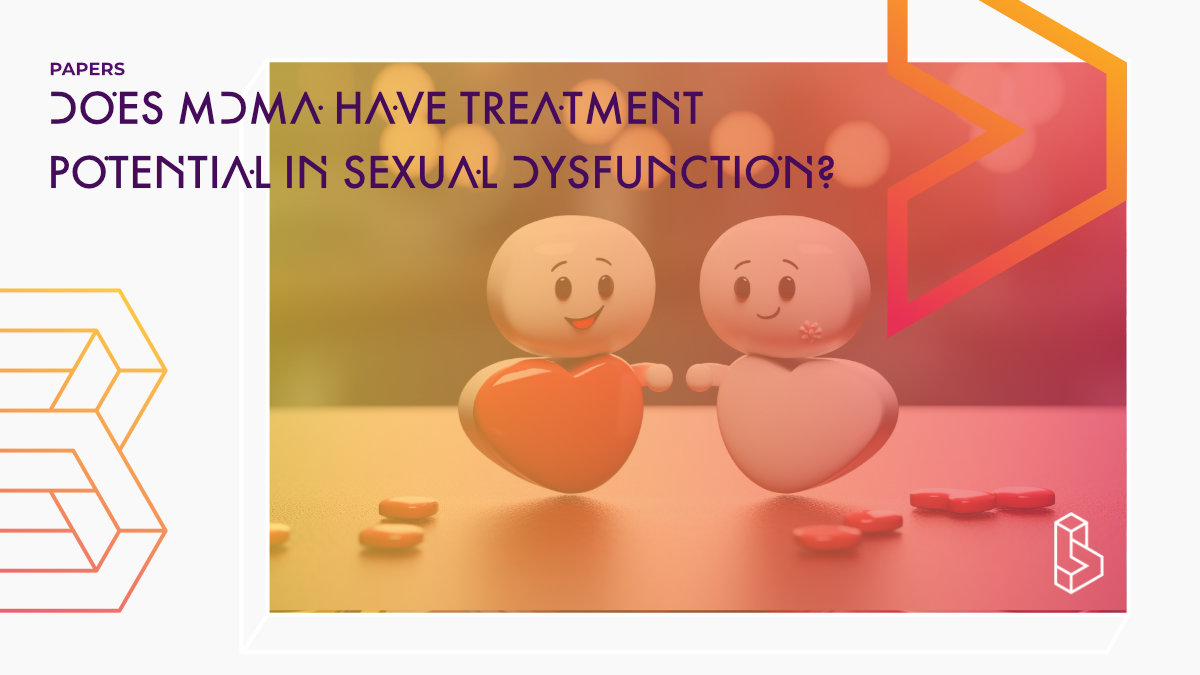This systematic review (2023, s=14) examines the effects of MDMA on the male and female sexual response cycles. Among women, MDMA showed increased sexual desire in 4 out of 6 studies, while in men, it exhibited varied effects on desire, arousal, and erectile function. Both genders experienced delayed orgasm but increased intensity and pleasure upon achieving it. Overall, while MDMA generally increased sexual desire and intensified orgasms, it presented conflicting evidence regarding sexual arousal and potentially impaired erectile and ejaculatory function in men.
Abstract of Does MDMA have treatment potential in sexual dysfunction?
“Introduction Sexual health, an integral component of overall well-being, is frequently compromised by common yet underdiagnosed sexual dysfunctions. Traditional interventions encompass pharmaceutical and psychological treatments. Unconventional therapies, like MDMA, offer hope for sexual dysfunction. This review delves into MDMA’s effects on sexual responsiveness and its potential role in treating sexual dysfunction.
Objectives The purpose of this review is to elucidate effects of MDMA on different domains of the female and male sexual response cycles.
Methods We conducted a systematic review on the effects of MDMA on each domain of the female and male sexual response cycles. PubMed, MEDLINE, and EMBASE were queried, and results were screened using PRISMA (Preferred Reporting Items for Systematic Reviews and Meta-Analyses) guidelines. Search terms utilized were “MDMA” or “ecstasy” in combination with “desire,” “arousal,” “lubrication,” “orgasm,” “pleasure,” “libido,” “erection,” and “ejaculation.” Inclusion criteria for this review were MDMA use by study subjects and sexual outcomes in at least 1 domain of the female and/or male sexual response cycles were described and measured. Randomized controlled trials, cohort studies (both prospective and retrospective), surveys, and literature reviews published between January 2000 and June 2022 were included. Case reports and studies that did not address conditions of interest were excluded from analysis. Duplicated search results were screened out. The remaining studies were then read in full text to ensure they met inclusion and exclusion criteria for analysis.
Results We identified 181 studies, of which 6 met criteria for assessment of the female sexual response cycle and 8 met criteria for assessment of the male sexual response cycle. Four of 6 studies reported increased sexual desire with MDMA use among women. Arousal and lubrication were improved with MDMA use in 3 of 4 studies, but they were not affected in 1 randomized control study. In men, 7 studies evaluated the effects of MDMA on desire and/or arousal, 5 studies measured impact on erection, 3 on orgasm, and 2 on ejaculation. Sixty percent of interview-based studies reported increased sexual desire in men, while 40% reported mixed or no effect. Two studies reported impairment of erection, 2 reported mixed effects, and 1 reported fear of erection impairment. In both men and women, all studies evaluating orgasm reported delay in achieving orgasm but increased intensity and pleasure if achieved. Primary outcome measures were variable and largely qualitative.
Conclusion Our findings suggest that MDMA generally increases sexual desire and intensifies orgasm when achieved. While producing conflicting evidence on sexual arousal in both sexes, MDMA may impair erectile and ejaculatory function in men.”
Authors: Ava Wexler, Alexandra Dubinskaya, Julie Suyama, Barry R Komisaruk, Jennifer Anger & Karyn Eilber
Summary of Does MDMA have treatment potential in sexual dysfunction?
Researchers have explored the potential therapeutic value of compounds typically associated with recreational use, like cannabis and LSD, in the treatment of sexual dysfunction, a situation perpetuated by societal stigma and the current limitations in available treatment options.
MDMA, colloquially known as “ecstasy,” is a synthetic amphetamine that has been attracting significant scientific interest. Its short-term psychological and physical effects include enhanced mood and euphoria while increasing extroversion and a feeling of overall well-being.
These 3 monoaminergic neurotransmitters play a similar role in both female and male sexual response cycles, and are released in varying quantities in response to MDMA ingestion.
Find this paper
https://doi.org/10.1093/sxmrev/qead046
Paywall | Google Scholar | Backup | 🕊
Cite this paper (APA)
Wexler, A., Dubinskaya, A., Suyama, J., Komisaruk, B. R., Anger, J., & Eilber, K. (2023). Does MDMA have treatment potential in sexual dysfunction? A systematic review of outcomes across the female and male sexual response cycles. Sexual Medicine Reviews, qead046.
Study details
Compounds studied
MDMA

